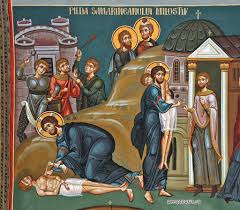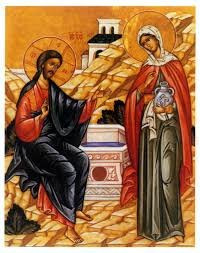 1 The Annunciation (Lk 1:26-38)
1 The Annunciation (Lk 1:26-38)
And the angel said to her in reply, “The Holy Spirit will come upon you, and the power of the Most High will overshadow you. Therefore the child to be born will be called holy, the Son of God. And behold, Elizabeth, your relative, has also conceived a son in her old age, and this is the sixth month for her who was called barren; for nothing will be impossible for God.” Mary said, “Behold, I am the handmaid of the Lord. May it be done to me according to your word.” Then the angel departed from her. (Lk 1:35-38)
The Blessed Virgin Mary gave her “fiat” to God even when she could not fully comprehend how all that could have happened. By her “yes” to God, she became impregnanted with Mercy, who is Jesus himself, and brought mercy to the world. Every time we accept the will of God in our lives, we too become bearers of mercy to all those around us. Mercy is impossible without God’s love. It takes faith, humility and total surrender for us to experience the mercy and love of God in our lives even if it does not make sense to our human logic.
 2 The Prodigal Son (Lk 15:11-32)
2 The Prodigal Son (Lk 15:11-32)
So he got up and went back to his father. While he was still a long way off, his father caught sight of him, and was filled with compassion. He ran to his son, embraced him and kissed him. His son said to him, “Father, I have sinned against heaven and against you; I no longer deserve to be called your son.” But his father ordered his servants, “Quickly bring the finest robe and put it on him; put a ring on his finger and sandals on his feet.” (Lk 15:20-22)
The parable of the prodigal son gives us a glimpse of how God looks at each of us when we turn to Him. The lost son, after spending all that was given to him, felt ashamed to come back to his father. It was the father who ran to his son when he saw him from afar. As a result of our sinfulness, we sometimes feel we are unworthy of God and His mercy. We feel that we need to change to be good in order to come to God. But every time we decide to turn back to God, He looks at us with mercy and compassion. He runs to us, embraces us; and it is in that we are changed and in turn, able to look at others with the same mercy.
 3 The Good Samaritan (Lk 10:29-37)
3 The Good Samaritan (Lk 10:29-37)
“Which of these three, in your opinion, was neighbour to the robbers’ victim?” He answered, “The one who treated him with mercy.” Jesus said to him, “Go and do likewise” (Lk 10:36-37).
In this single act of mercy and compassion of the Good Samaritan, we are reminded that every person is a beloved child of God. No one person who is in need deserves to be ignored. As we respond to be a missionary Church, let us truly humble ourselves to realise and reach out to the needs of those around us. Every person we encounter is an opportunity for God to work mercy through us, we are all called by Jesus to do likewise to be merciful to others just as the Father is merciful to us.
 4 The Anointing at Bethany (Mt 26:6-13; Mk 14:3-9; Jn 12:1-11)
4 The Anointing at Bethany (Mt 26:6-13; Mk 14:3-9; Jn 12:1-11)
“It could have been sold for more than three hundred days’ wages and the money given to the poor.” They were infuriated with her. Jesus said, “Let her alone. Why do you make trouble for her? She has done a good thing for me. The poor you will always have with you, and whenever you wish you can do good to them, but you will not always have me” (Mk 14:5-7).
The anointing of the feet of Jesus by Mary with costly ointment becomes significant to us as we celebrate the Year of Mercy. Contrary to the selfishness portrayed by Judas Iscariot, she gave the best of what she had to the Lord. True love and mercy must cost. The cost of Jesus’ love for us was His life. As we respond to be conduits of mercy, may we too experience the infinite love and mercy of God in our lives that we may respond to His love by giving ourselves unsparingly to all that God calls us to do.
 5 The Samaritan Woman (Jn 4:4-42)
5 The Samaritan Woman (Jn 4:4-42)
Meanwhile the disciples urged him, “Rabbi, eat.” But he said to them, “I have food to eat of which you do not know.” So the disciples said to one another, “Could someone have brought him something to do?” Jesus said to them, “My food is to do the will of the one who sent me and to finish his work. Do you not say, ‘In four months the harvest will be here?’ I tell you, look up and see the fields ripe for the harvest. The reaper is already receiving his payment and gathering crops for eternal life, so that the sower and reaper can rejoice together. For here the saying is verified that ‘One sows and another reaps.’ I sent you to reap what you have not worked for; others have done the work, and you are sharing the fruits of their work” (Jn 4:31-38).
After the Samaritan woman met Jesus at the well, she went to the city to tell the people, “Come, see the man who told me all that I ever did.” When we meet Jesus in the Word and in the Sacraments, he reveals to us, not only Himself, but ourselves. Coming face to face with our real selves can be hard and painful. We ought to know that when God shows us who are really are, it is never with condemnation, but with love and mercy. Just as the Samaritan woman’s life changed upon her encounter with Jesus, may we too allow the Truth to set us free.
 6 The Man Born Blind (Jn 9:1-41)
6 The Man Born Blind (Jn 9:1-41)
His disciples asked him, “Rabbi, who sinned, this man or his parents, that he was born blind?” Jesus answered, “Neither he nor his parents sinned; it is so that the works of God might be made visible through him” (Jn 9:2-3).
Jesus explained to His disciples that the blindness of the man was not a consequence of what he or his parents have done, but it was so that God’s work could be seen through him. God’s justice is His love and mercy. Many times we try to justify the pain that we go through, just so that we can get a clearer picture of everything and be in the know of what comes next. God calls us to trust in Him. Many times, there are no answers to our sufferings that can truly be satisfying. However, suffering can draw us closer to the mercy and love of God. He turns ashes into beauty, and calls us to glorify His Name through our suffering.
 7 The Crucifixion of Jesus (Mt 27:33-44; Mk 15:22-32; Lk 23:33-43; Jn 19:17-24)
7 The Crucifixion of Jesus (Mt 27:33-44; Mk 15:22-32; Lk 23:33-43; Jn 19:17-24)
When they came to the place called the Skull, they crucified him and the criminals there, one on his right, the other on his left. Then Jesus said, “Father, forgive them, they know not what they do.” They divided his garments by casting lots. (Lk 23:33-34)
The great mercy of God was displayed when Jesus was crucified. Our sins have put Him on the Cross. Yet, in His immense pain and passion, He demonstrated that His love was perfect and boundless – a love that knows no end. We are called to be merciful, not because of our own goodness, but purely because we have a merciful God who never ceases to love us. God forgives us even when we commit sins over and over again, because He understands our struggles and weaknesses.
 8 The Resurrection of Jesus (Mt 28:1-10; Mk 16:1-8; Lk 24:1-12; Jn 20:1-10)
8 The Resurrection of Jesus (Mt 28:1-10; Mk 16:1-8; Lk 24:1-12; Jn 20:1-10)
He said to them, “Do not be amazed! You seek Jesus of Nazareth, the crucified. He has been raised; he is not here. Behold, the place where they laid him. But go and tell his disciples and Peter, ‘He is going before you to Galilee; there you will see him, as he told you'” (Mk 16:6-7).
After witnessing their only hope being crucified, the disciples came to the tomb of Jesus, only to be surprised that He was not there. The empty tomb can well signify that we are called to always look ahead, and not dwell in our past. Jesus is Lord of the present and with Him, there is always new life. It does not matter where we have been, or what we have done; what matters is that we begin anew by accepting God’s mercy into our lives. God will not abandon us even through we have turned our backs on Him. He is always ready to welcome us and He waits for us to return to Him at our own pace.
Prepared by Sacred Heart Cathedral Kota Kinabalu 2015.
